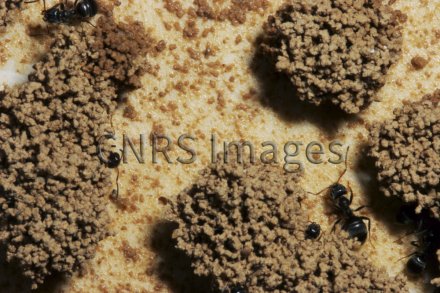Production year
2007

© Guy THERAULAZ/CRCA/CNRS Images
20170018_0008
Regularly spaced pillars and walls of an antheap built in experimental conditions by a group of 500 ants of the Lasius niger species. By putting ants into experimental devices, research scientists are studying antheap formation. Consequently, they have discovered that ants deposit a pheromone onto the pellets of earth that they move, and it is this chemical substance that governs the entire dynamics of construction, the growth and the shape of the nests. If weather conditions result in rapid evaporation of the pheromone, the ants will build fewer pillars, thus enabling improved retention of moisture. It is this ability to adapt their habitat to their environment, and especially weather conditions, that is of particular interest to the research scientists. They are trying to understand how these insects, guided by their collective intelligence, manage to build very elaborate structures while exhibiting simple individual behaviour.
The use of media visible on the CNRS Images Platform can be granted on request. Any reproduction or representation is forbidden without prior authorization from CNRS Images (except for resources under Creative Commons license).
No modification of an image may be made without the prior consent of CNRS Images.
No use of an image for advertising purposes or distribution to a third party may be made without the prior agreement of CNRS Images.
For more information, please consult our general conditions
2007
Our work is guided by the way scientists question the world around them and we translate their research into images to help people to understand the world better and to awaken their curiosity and wonderment.